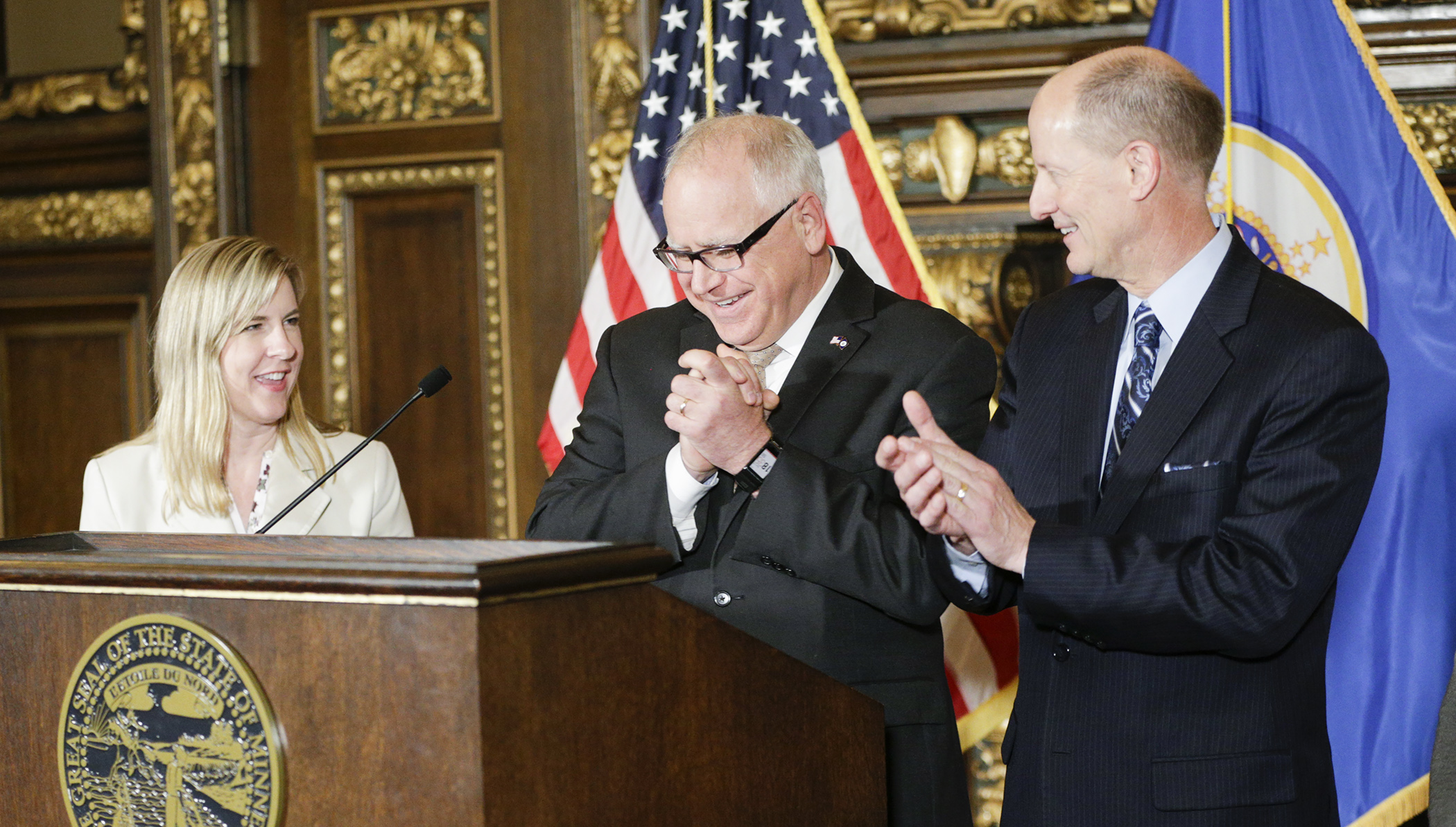Governor, legislative leaders agree to $48 billion biennial budget

Updated 10:29 p.m. — After weeks of closed-door negotiations bent on bridging large philosophical and financial gaps, Gov. Tim Walz and legislative leaders announced an agreement Sunday evening that would fund state government for the 2020-21 biennium.
Flanked by the House Speaker Melissa Hortman (DFL-Brooklyn Park) and Senate Majority Leader Paul Gazelka (R-Nisswa), Walz touted the bipartisan agreement as a successful compromise between DFL desires to increase funding for education and health care and Republicans’ hopes of holding the line on state spending and taxation.
The approximately $48 billion budget – which Gazelka characterized as a 3 percent rise in spending each year – found Walz surrendering on his proposal to raise the gas tax by 20 cents a gallon.
“I made no bones about it,” Walz said. “I don’t think there’s any disagreement that we want to all find a way to get infrastructure fixed. We couldn’t come to an agreement on where that was.”
[MORE See the agreement]
Meanwhile, Gazelka agreed to continue to fund government health care programs for low-income Minnesotans with a provider tax that would drop to 1.8 percent from its current 2 percent. Agreement was also reached to continue health reinsurance for an additional two years.
Hortman spoke of the compromises reached as “bending the cost curve in health care.” Walz said the sunset provision that would have ended the provider tax at the end of this year would have “put too many people at risk.”
House Minority Leader Kurt Daudt (R-Crown) spoke disparagingly of the budget agreement, saying that reducing health care costs was something all Republicans had focused on in their election campaigns and that he doesn’t believe it delivers that.
The agreement also reduces the state’s budget reserve by almost $491.37 million in the 2022-23 biennium. Walz said his position was that the “rainy day” fund should not go below $2 billion, and he said it achieves that goal.
Gazelka spoke of both sides wanting to win in negotiations, but “it was a draw and it’s good for Minnesotans.” He posited that the budget would provide “ample funding for education” – something with which Hortman agreed -- and health and human services programs for “people who need it.”
“One of the highlights that we were really trying to accomplish was that middle-class tax cut,” Gazelka said. “It’s the first time, I believe, in two decades that we’ve actually lowered an income tax rate.” The second-tier tax rate would be reduced by 0.25 percent under the proposal.
Hortman said that the plan is for conference committees to complete their reports by 5 p.m. Monday. “I would suspect that we can get a special session completed in one day, on Thursday, if everybody agrees and everybody’s schedules work out.”
As for complaints that too much of the negotiating process was conducted without communication with the public, Walz said, “I agree that the process piece of this, that there are things we need to look at, but the product, we’re really proud of.”
“We agreed to a budget deal,” Hortman added. “We are leaving it to the leadership of all of the members of the Legislature and the commissioners of the state of Minnesota to work out the agreements in public, with the input of the public, to even further enrich this deal.”
“We did something here in 2019 that is a big deal,” Walz said. “Divided government with vastly different visions and vastly different budgets that came together in a manner that was respectful.”
— Session Daily writers Rachel Kats, Erin Martin and Tim Walker contributed to this story.
Related Articles
Search Session Daily
Advanced Search OptionsPriority Dailies
Ways and Means Committee OKs House budget resolution
By Mike Cook Total net General Fund expenditures in the 2026-27 biennium will not exceed a hair less than $66.62 billion.
That is the budget resolution approved Tuesday by the House Ways...
Total net General Fund expenditures in the 2026-27 biennium will not exceed a hair less than $66.62 billion.
That is the budget resolution approved Tuesday by the House Ways...
Minnesota's budget outlook worsens in both near, long term
By Rob Hubbard It looks as if those calling for less state spending could get their wish, judging from Thursday’s release of the February 2025 Budget and Economic Forecast.
A state su...
It looks as if those calling for less state spending could get their wish, judging from Thursday’s release of the February 2025 Budget and Economic Forecast.
A state su...